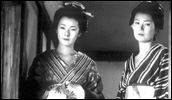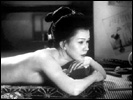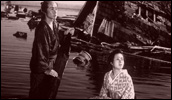The Sea Is Watching
- Year
- 2002
- Original title
- Umi wa Miteita
- Japanese title
- 海は見ていた
- Director
- Cast
- Running time
- 114 minutes
- Published
- 23 April 2009



by Simon Cotterill
From a foreign viewpoint the 1970s were a bit of a low ebb for Japanese cinema; far fewer films impacted internationally than in the preceding two decades. However, in 1975 there was a small purple patch. Films by two Japanese directors were nominated for the Best Foreign Film award at the Oscars, an almost unique feat considering each country is only allowed one entrant for this category of the Academy Awards. Kei Kumai's Sandakan No. 8, a film about Japanese women forced into prostitution in the early 20th century, went up against Akira Kurosawa's Dersu Uzala, a film about a Russian explorer's journey into Siberia during the same period of history. Kurosawa's movie, a Soviet-Japanese co-production made at the height of the Soviet Union's conflict with China, was the USSR entrant for the award and, hence, these two Japanese directors were able to go up against each other in the foreign film category, alongside films from Poland, Mexico, and Italy.
Dersu Uzala was Kurosawa's only film made outside Japan, his only film not made in the Japanese language, and ironically his only film to win an Academy Award (at least until his lifetime achievement prize fourteen years later). I wonder how Kei Kumai felt as he watched his countryman collect the award he must have wanted so much to receive himself. I wonder if he could have imagined that twenty-seven years later he would be directing The Sea Is Watching - based on Kurosawa's final script.
The last film Kurosawa himself directed was Not Yet (Mada Dayo) in 1992, but before his death in 1998 he had written two follow-ups; After the Rain and The Sea is Watching. His son, the producer Hisao Kurosawa, decided that these final two scripts should be filmed to complete his father's legacy. He himself produced After the Rain in 1999, with his late father's assistant Takashi Koizumi making his directing debut, and other members of Akira Kurosawa's filmmaking family trying to channel their master's spirit onto the screen. The second script, The Sea Is Watching, was given by Hisao Kurosawa to Kei Kumai in 2002.
The 1975 Oscar nomination aside, Kei Kumai was a big-name director in Japan anyway. Many of his films had garnered domestic awards, and films like Shinobugawa (1972) and The Sea and Poison (Umi to Dokuyaku, 1986) had also won international recognition. Kumai wasn't going to make The Sea Is Watching script into just another 'Akira Kurosawa by proxy' film. Despite using Kurosawa's continuity drawings and production notes, Kumai brings his own directorial style to The Sea Is Watching, a story which, being set in an Edo-period brothel, is in familiar territory for him.
The Sea Is Watching's whorehouse is in the Fukugawa 'pleasure district' alongside the Sumida River, where a large number of courtesans ply their trade. Amongst these is O-Shin (Tono), a beautiful young woman who finds herself harbouring a samurai on the run, Fusanosuke (Yoshioka). He has told her that he cut somebody in a quarrel and that now the injured man and his companions are seeking to kill him. With her mistress's approval, O-Shin agrees to hide Fusanosuke and love blooms.
Fusanosuke tells O-Shin that she can cleanse her 'dirty' body of its sins by quitting prostitution, and promises marriage to her. Kikuno, a veteran courtesan who is herself being pursued by two men, warns O-Shin to 'never lose her heart to a customer'. Like many of the other girls, Kikuno only trusts one thing: money. But despite Kikuno's tough exterior she has a warm heart, and along with the other women at the brothel she offers to help O-Shin by taking her customers. O-Shin hesitantly agrees and begins to prepare for marital bliss with Fusanosuke.
The Sea Is Watching is based on two short stories by Shugoro Yamamoto: The Smell of an Unknown Flower and Before the Dew Dries. Yamamoto was Kurosawa's favourite author, but these stories focus on themes, female characters, and star-crossed lovers, which are unusual for a Kurosawa film. It isn't too much of a spoiler to say that love affairs like that of O-Shin and Fusanosuku, which transcend societal divisions, aren't destined to go very smoothly. And, in line with conventions of Japanese fiction, theirs doesn't, though all is not lost.
Teizo Matsumura's score, poorly chosen by Kei Kumai, seems at times to be trying to convince you of the story's banality. But The Sea Is Watching is saved by the actors and by Kumai's powerful, expressionistic imagery. The acting throughout the film is strong, if at times a little melodramatic for a hardened western palate. The best performance comes from Misa Shimizu as Kikuno, whose emotional final scene against a star-filled sky provides the audience with a message, seemingly direct from Kurosawa's lips, that we should live for the moment, as the moment is all we have.
The Sea Is Watching proved to be not only the last Kurosawa film, but Kei Kumai's final film too. He died in Tokyo on 23rd May 2007. With almost twenty films to his name as a director, Kumai will always be remembered in Japan for the tear-draining, emotional intensity of his movies and for his empathy with female characters. He will, almost certainly and perhaps sadly, be best remembered outside Japan, as the only Japanese filmmaker to be beaten by one of his own countrymen to the Best Foreign Film Oscar.